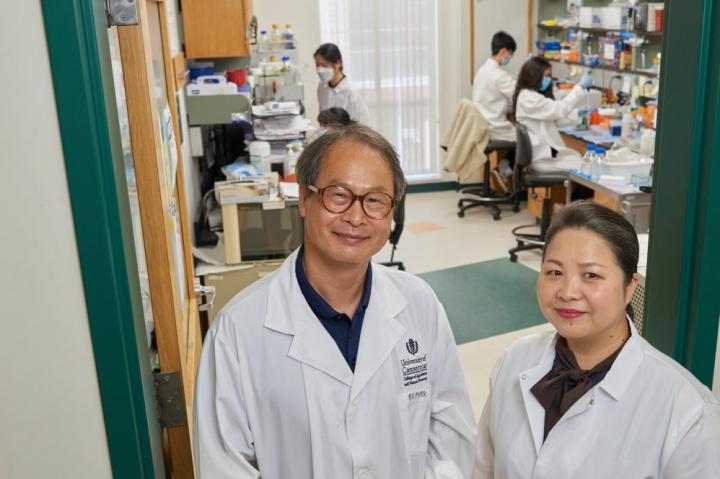A first-of-its-kind study finds nutrition benefits for locally-grown sugar kelp, an increasingly important crop for the state.
When most Americans think of seaweed, they probably conjure images of a slimy plant they encounter at the beach. But seaweed can be a nutritious food too. A pair of UConn researchers recently discovered Connecticut-grown sugar kelp may help prevent weight gain and the onset of conditions associated with obesity.
In a https://www.sciencedirect.com/science/article/abs/pii/S0955286321002199%0D%0A
%0D%0A”>paper published in the Journal of Nutritional Biochemistry by College of Agriculture, Health, and Natural Resources faculty Young-Ki Park, assistant research professor in the Department of Nutritional Sciences, and Ji-Young Lee, professor and head of the Department of Nutritional Sciences, the researchers reported significant findings supporting the nutritional benefits of Connecticut-grown sugar kelp. They found brown sugar kelp (Saccharina latissima) inhibits hepatic inflammation and fibrosis in a mouse model of diet-induced non-alcoholic steatohepatitis, a fatty liver disease.
They studied the differences between three groups of mouse models. They placed two on high-fat diets but incorporated sugar kelp, a kind of seaweed, into the diet of one. The third group was on a low-fat diet as a healthy control. The group that ate sugar kelp had lower body weight and less adipose tissue inflammation – a key factor in a host of obesity-related diseases – than the other high-fat group.
Consuming sugar kelp also helped prevent the development of steatosis, the accumulation of fat in the liver. Nonalcoholic steatohepatitis (NASH) is a condition often associated with obesity that can cause inflammation and reduced functionality in the liver.
The mice on the sugar kelp diet also had healthier gut microbiomes. The microbiome is a collection of bacteria and other microorganisms in and on our bodies. The diversity and composition of the microbiome are key to maintaining a host of health functions.
“I wasn’t surprised to see the data, as we know seaweeds are healthy,” Lee says. “But it’s still pretty amazing data as this is the first scientific evidence for health benefits of the Connecticut-grown sugar kelp.”
This study is the first time researchers have looked at the link between the US-grown sugar kelp and obesity.
“There hadn’t been a study about this kind of aspect before,” Park says.
Park and Lee saw an opportunity to conduct research on the nutritional science of seaweed, a growing agricultural industry in the United States. They hoped that, by gathering concrete data on the health benefits of sugar kelp, it could encourage people to consume seaweed.
“Consumers these days are getting smarter and smarter,” Lee says. “The nutritional aspect is really important for the growth of the seaweed industry in Connecticut.”
The researchers specifically used Connecticut-grown sugar kelp, as Connecticut regulates the safety of seaweeds. This is important for monitoring heavy metals that seaweed may absorb from the water.
Most of the seaweed consumed in the US is imported. Park and Lee hope more research on the benefits of locally grown seaweed will prompt consumers to support the industry stateside.
“It’s really an ever-growing industry in the world,” Lee says.
After completing this pre-clinical study, the researchers now hope to move into clinical studies to investigate the benefits sugar kelp may have for other health concerns. They also want to work on reaching out to people to teach them how to incorporate sugar kelp into their diet.
This work represents a fruitful collaboration between researchers, farmers, and the state.
“Farmers need to know what we’re doing is a good thing to help boost their sales,” Park says. “We can be a partner.”
In collaboration with Anoushka Concepcion, an extension educator with the Connecticut Sea Grant and UConn Extension Program, Park and Lee hope to build stronger partnerships with seaweed growers in Connecticut.
###
Media Contact
Jessica McBride, PhD
[email protected]
Original Source
https:/
Related Journal Article
http://dx.





